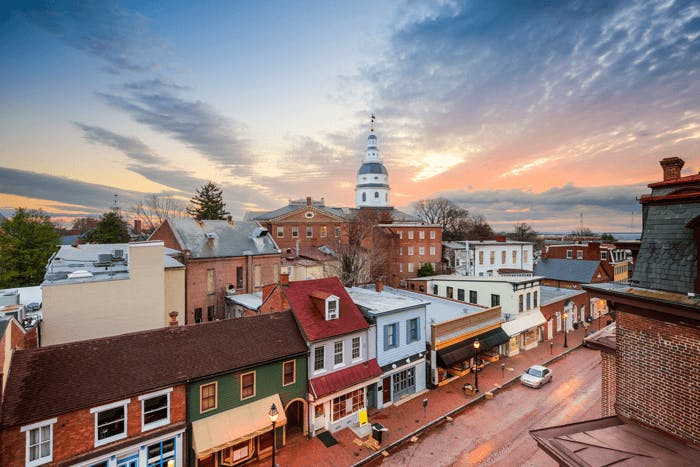
Maryland, My Maryland! Or your Maryland. Or everyone’s Maryland. Ever the Mason-Dixon state, Maryland has always had a bit of an identity crisis. Is it Southern or Northern? Depending on where you go, you could say either. Maryland is full or little juxtapositions. North vs. South. Rich vs. poor. Old vs. young. Rural vs. urban. All of these can be found in the state, and all of them seem to be in a constant struggle for supremacy. However, there’s one aspect to Maryland that nitpicking over definitions won’t change: crime. With Baltimore in the northern part of the state and Washington D.C. right below it, Marylanders up and down the 95 corridors have a lot to worry about, both from locals and from those who use the state as a convenient thoroughfare. Thankfully, home security in Maryland is a pretty big business.
Home Security Provider Requirements for Maryland
Crime in Maryland is a varied thing. The complexity is due to Maryland existing like a crab cake sandwich between so many other large metropolitan areas. It doesn’t help that the state has one of the busiest interstate highways in the country running right through its heart, and has its own, large population centers to worry about. Nevertheless, the state’s extremely wide mixture of rural and urban areas results in a complex situation when it comes to crime.
Take, for example, the crime rates for the entire state as a whole: 4.46 violent crimes per 1,000 people and 25.08 property crimes per 1,000 people. For comparison, the national violent crime median is 3.8/1,000 people and 26/1,000 people for property crimes. Maryland’s looking pretty good, right?
Well, not so much. If you live along the 95 corridor, which consists of Baltimore, College Park (go Terps!) and everything in-between, your crime rates look significantly different. If you live in Baltimore, your chances of becoming a victim of a violent crime jump from 1 in 224, to 1 in 73. College Park residents as well see a jump in property crime rates, to a 1 in 33 chance, although, on the bright side, College Park residents do enjoy nearly half the amount of violent crimes as what is experienced in Maryland, on average.
With property crime rates ranging from average to well above average in Maryland, what can a resident expect from the home security market? If you live in Frederick, Calvert or Washington County, your alarm companies are well regulated on the county level. If you live anywhere else, well, you may just have to do a bit of digging around, including making calls to your local police force.
The state government has turned over regulatory power on the home security provider industry in Frederick, Calvert, and Washington counties. We are unsure why only these three counties get this unique privilege, although chances are they probably asked nicely. Maryland has granted these three counties with the following regulatory powers:
- Register alarm system contractors operating in the county
- Register alarm users in the county
- Provide penalties for failure to register as an alarm system contractor or alarm user
- Provide civil citations and penalties for false alarms
- Provide exemptions from the issuance of civil citations and penalties for false alarms
- Authorize the designated county enforcement agency to maintain a record of the alarm system contractor, monitoring service, and manufacturer of each security system in operation in the county
They are also allowed to authorize the designated county enforcement agency, if it finds a pattern of false alarms, to inform the manufacturer of the model or the alarm system contractor that installed the alarm system and the appropriate State or national licensing agency or the certification standards entity.
As you can see from the above list, taken directly from the requisite Maryland law (Md. local government code ann. § 12-806), these three Maryland counties don’t play around when it comes to home security requirements. Not even a blue shelled crab smothered in Old Bay seasoning would be enough of a bribe to get out of these regulations. And note that these regulations apply to both businesses and customers, designed to keep away poor businesses with lousy track records, and customers with an itchy trigger finger on the home alarm panic button.
What about all other cities and counties in Maryland? There are a few noteworthy rules governing the rest of the state and those counties that get to make up some of their own rules. Like most other states, Maryland requires anyone performing electrical work to be fully licensed as an electrician. The state even imposes rather harsh penalties for those who misrepresent their own electrical skills, and who acquire licenses under false pretenses to perform such work.
All security alarm companies in the state must also register their businesses at the state level. The state provides an application to that effect, and registrants must submit their applications to the Maryland State Police. Maryland residents can rest easy with this one, as the state does require those registering their security alarm business to provide information related to past criminal history. What it does not indicate, however, is hiring practices. That said, the state requires companies to purchase fidelity insurance as a good faith gesture and a requirement of doing business. You know. Just in case.
Outside of this, as stated, you’re just going to have to put on your sleuthing hat and hope for the best. Every city will have its own rules and regulations, so be extra vigilant to check those out with your local police office.
Home Security Cameras
The Herbst Firm, a Maryland-based law firm, says it best: “It is not a crime to place a camera in a public area and film another person in their house, nor is it a crime if the camera is placed for business purposes, by law enforcement with a valid purpose, or by an adult resident of the house.”
There you have it, Maryland! Security cameras in your state are a go! There are, of course, still some issues you’ll want to concern yourself with. In general, privacy laws, particularly related to surveillance and recordings, can be a bit of a murky area legally. Maryland is no exception. Although the state has no laws barring security cameras, you do want to be sure you’re not running up any privacy laws that do count against you and do matter.
Anyone wishing to put up a few security cameras should know two things about Maryland’s privacy laws:
- They’re designed to protect citizens from intrusion on solitude
- They’re designed to protect citizens from undesired or unwanted recordings
Maryland is one of twelve states that require all parties in a recorded conversation to agree to that recording. What this means for Maryland residents is one thing: Turn off the audio on your cameras! While it’s unlikely you might be prosecuted for recording around your house, there’s really no reason to take the risk. Also, considering the rather vague language in “protecting citizens from intrusion on solitude”, it’s best to make sure your cameras are only capturing your own property. Angle your cameras away from your neighbors’ houses. It’s better to avoid any risks.
Safety During Natural Disasters
Maryland’s it’s “not quite north, not quite south” position applies to its weather patterns as well. Maryland residents might well remember more than a few days when it snowed in the morning and was sunny and warm by noon. How many other states can boast of such weird weather? D.C. perhaps. Then again, D.C. isn’t a state (sorry D.C.). Given its close proximity to the Atlantic, mountain ranges and muggy swamp areas, Maryland experiences all sorts of weather patterns: heavy thunderstorms, heavy snow and ice, floods, tropical storms, Nor’easters and even the occasional tornado. Don’t move out quite just yet. Maryland is actually a fairly safe place, as most of these natural disasters are quite rare.
Even still, Maryland residents should take some precautions during all times of the year. During the summer, floods can be common in some parts of the state. To protect yourself, make sure you have extra water, food, and spare batteries. Remember to avoid driving on roads that are covered in water. A helpful hint: if you cannot see the lines, don’t drive on the road. It’s uncommon for Maryland homes to get completely flood, so this is unlikely to be a concern for you. However, many drivers end up stuck in cars due to flooded roads.
During the winter months, heavy snows are common. Maryland’s unique geography also results in a fair amount of icing on roads due to freezing rain. For safety, bring along spare provisions in your car, as well as blankets and emergency road gear. It is not uncommon for drivers to spin out of control during the winter, or for heavy snows and ice storms to result in huge traffic backups on the interstate and the Beltway. Prepare for the long haul, make sure you have the proper tires, and in the chance that you are stuck on the road, make sure you have spare food, water, and warm clothing.
Getting great home security in Maryland is as easy as it gets. Don’t let a few crabby experiences sour your search for a trusty home security system. Even if you aren’t in one of the few countries with its own regulations, you can still rest assured that most home security providers are on the up and up. If not, it certainly won’t take more than a few phone calls and a little internet research to figure out they’re not quite right for you.

